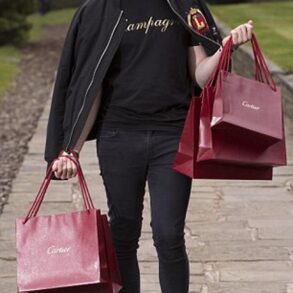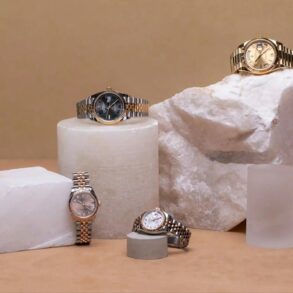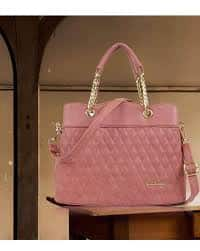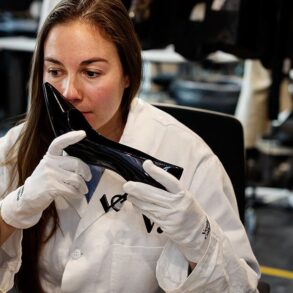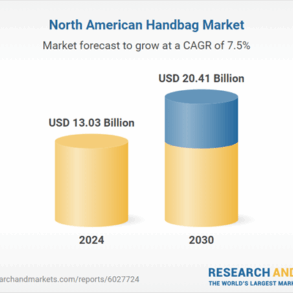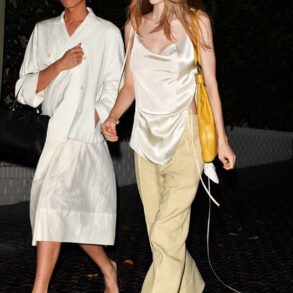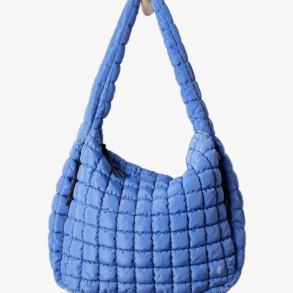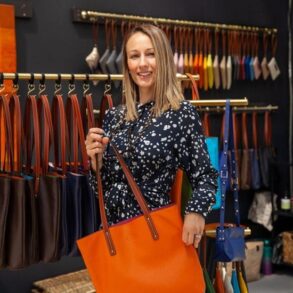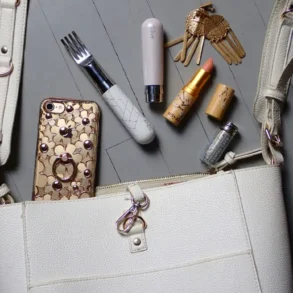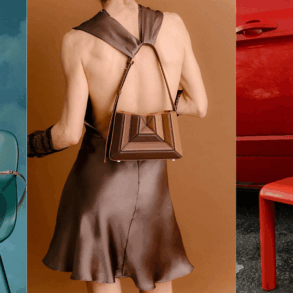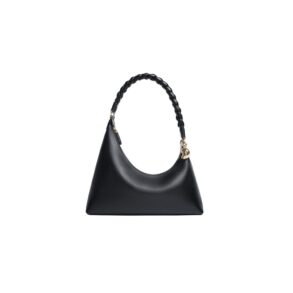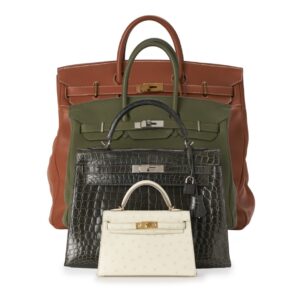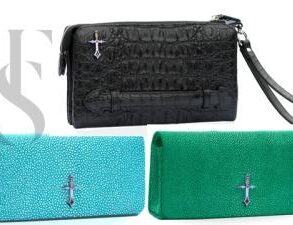An extraordinary collaboration is set to revolutionize the future of sustainable fashion. VML, Lab-Grown Leather Ltd., and The Organoid Company have announced a partnership to develop the world’s first T-Rex leather, combining creative innovation, genomic engineering, and advanced tissue engineering.
This project aims to create a cruelty-free, eco-friendly material engineered using reconstructed Tyrannosaurus Rex DNA, representing a pioneering step for the luxury goods industry.
The new venture combines VML Netherlands’ creative expertise, The Organoid Company’s genome engineering leadership, and Lab-Grown Leather’s proprietary Advanced Tissue Engineering Platform (ATEP™). Together, they plan to produce a next-generation leather that could reshape luxury manufacturing while promoting sustainable practices.
Rather than using plants or synthetic materials, the process focuses on cultivating real biological structures, resulting in a product that is genetically and structurally identical to traditional leather.
Inspired by Prehistoric Resilience
The science behind the project is as fascinating as the final product. Researchers are using fossilized collagen from 80-million-year-old T-Rex fossils as a blueprint.
By engineering cells with synthetic DNA designed by The Organoid Company and integrating them into Lab-Grown Leather’s Elemental-X™ product stream, they can generate authentic skin structures.
Lab-Grown Leather’s “scaffold-free” tissue engineering approach allows cells to form their own natural network, producing material that faithfully mirrors the properties of real leather.
Dinosaurs like the T-Rex evolved to survive extreme environmental conditions, a trait scientists believe offers valuable insight as modern ecosystems face the pressures of accelerated climate change.
Through this initiative, ancient biology becomes a model for next-generation, lab-cultivated materials that are both durable and adaptable.
Professor Che Connon from Lab-Grown Leather stated, “This venture showcases the power of cell-based technology to create materials that are both innovative and ethically sound.”
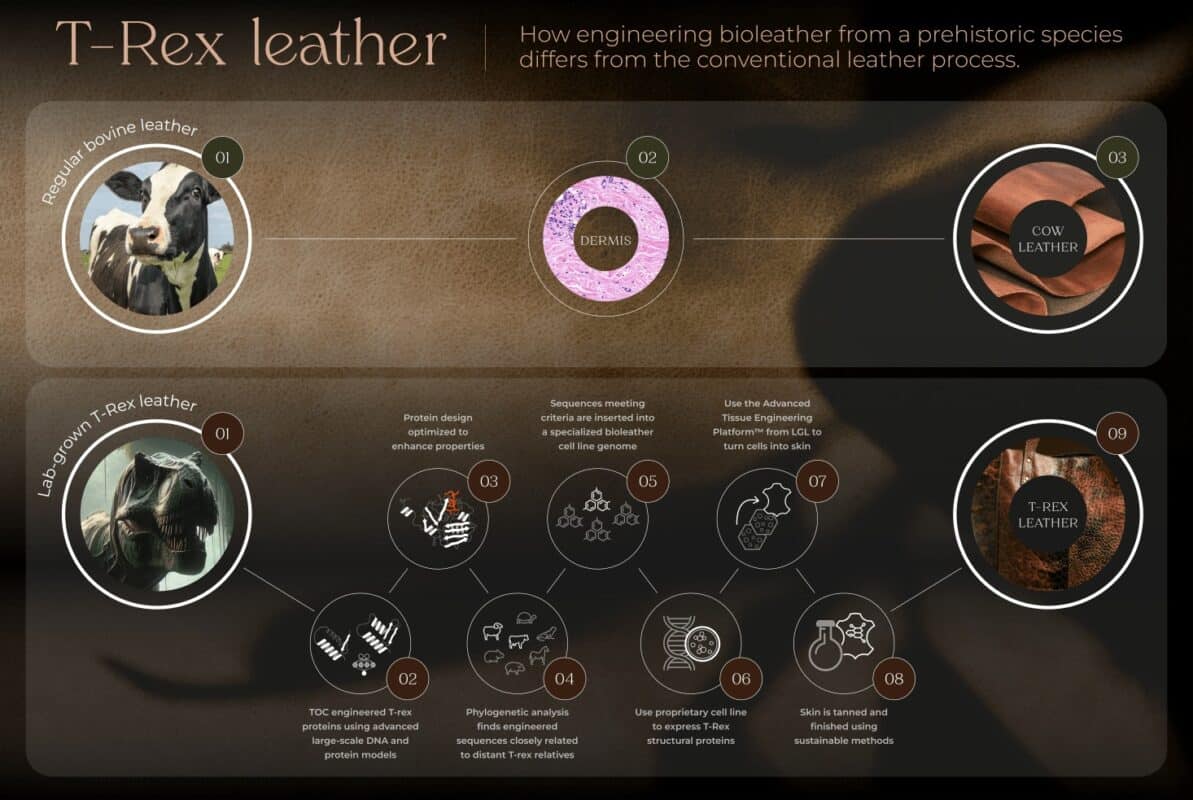
Ethical and Environmental Innovation
This groundbreaking leather alternative aims to drastically reduce the environmental impacts associated with traditional leather production.
Conventional methods contribute significantly to deforestation and often involve harmful chemicals like chromium, leading to soil and water pollution.
By contrast, the T-Rex leather technology provides a pathway to eliminate animal cruelty and cut down ecological damage. The resulting Elemental Leather™ is biodegradable and maintains the same durability, repairability, and texture that consumers expect from luxury leather goods.
The project also reflects a shift toward meeting the demands of modern consumers, who increasingly prioritize environmental responsibility alongside innovation.
Unlike plant-based or synthetic leathers, Elemental Leather™ is created entirely from animal cells and proteins, offering a natural structure without external scaffolding.
According to the companies, this makes the material not just an alternative but “true leather,” crafted without additives or compromises on authenticity.
Ancient Inspiration for Future Markets
Initial applications for T-Rex leather will target luxury accessories, with a flagship fashion item planned by the end of 2025. Following the launch, the partners aim to scale production for use in industries beyond fashion, including automotive and smart textiles.
With a global leather goods market projected to reach $780 billion by 2035, and bio-based materials growing at 10–15% annually, the potential for expansion is significant.
Thomas Mitchell, CEO of The Organoid Company, explained, “By reconstructing and optimizing ancient protein sequences, we can design T-Rex leather, a biomaterial inspired by prehistoric biology, and clone it into a custom-engineered cell line.”
The project not only pushes the boundaries of synthetic biology but also demonstrates how ancient resilience can inspire sustainable innovation today.
Bas Korsten, Global Chief Creative Officer at VML, summed up the collaboration by stating, “With T-Rex leather we’re harnessing the biology of the past to create the luxury materials of the future. This groundbreaking collaboration represents the intersection of creative innovation and cutting-edge biotechnology.”
This post was originally published on this site be sure to check out more of their content.




